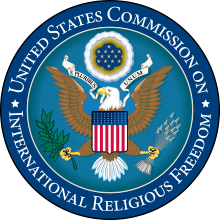


 WASHINGTON, DC – The United States Commission on International Religious Freedom (USCIRF) today released a study conducted by Bauman Global on Shari’ah Criminal Law in Northern Nigeria. The report examines the laws and institutions in three northern states in Nigeria: Kano, Sokoto, and Zamfara, which are among 12 states where Islamic penal laws and criminal procedure codes are used.
WASHINGTON, DC – The United States Commission on International Religious Freedom (USCIRF) today released a study conducted by Bauman Global on Shari’ah Criminal Law in Northern Nigeria. The report examines the laws and institutions in three northern states in Nigeria: Kano, Sokoto, and Zamfara, which are among 12 states where Islamic penal laws and criminal procedure codes are used.
“This report demonstrates the problematic implications of using one religion as the basis of law enforcement in these states. It is unnerving to learn of the latitude of authority given to hisbah groups, the lack of protection against discrimination, the prevalence of flogging as a punishment, and the great need for stronger oversight and human rights training for justice and security personnel,” said Chair Tony Perkins.
Researchers analyzed 173 cases from 2017 and conducted 147 interviews with court judges, prosecutors and defense attorneys, journalists, legal experts, religious leaders, individuals who had been tried in the courts, and others. They found that over 75% of Muslims and some Christians prefer Shari’ah courts because they are cheaper, faster, and conducted in the Hausa language. Despite the positive perceptions shared, interviews also repeatedly raised concerns about corruption, unfair trials, and confessions obtained through the use of torture.
Vice Chair Gayle Manchin noted that “This report will certainly serve as a valuable resource for policymakers and practitioners seeking to support Nigeria, to improve justice and security, and to protect religious freedom in the country.”
In its 2019 Annual Report, USCIRF again recommended that Nigeria be designated by the State Department as a Country of Particular Concern (CPC) for religious freedom violations that are “systematic, ongoing and egregious.” USCIRF has recommended CPC status for Nigeria since 2009, however the State Department has never designated it as such.
“The freedoms of religion or belief and expression or opinion, enshrined in Articles 18 and 19 of the Universal Declaration of Human Rights respectively, are intricately linked. This report illustrates how essential it is that we work to safeguard both rights when countering discrimination and hate,” said Chair Tony Perkins.
The report details the prevalence of problematic speech laws in more than half of the countries in Africa: at least nine countries maintain apostasy laws; 26 countries have laws against blasphemy; and 29 countries criminalize hate speech. Laws that prohibit blasphemy (the insult of a religion or religious objects or places) and apostasy (the public renunciation of one’s faith) violate international human rights law. Narrow restrictions on hate speech and its most dangerous forms, such as incitement to genocide, are permissible under international law. But, the effects of broad and vague hate speech laws have the potential to negatively impact religious freedom.
“We have seen the dangers of speech laws that fail to protect human rights in Africa – from the misapplication of hate speech laws in South Sudan to the use of the blasphemy law in Mauritania to impose a death sentence on a blogger. We urge the U.S. government to push for the repeal of blasphemy and apostasy laws in Africa, as well as for the assessment and reform of hate speech laws to conform with international standards,” said Vice Chair Gayle Manchin.
USCIRF is holding a public briefing entitled “Silencing Religious Freedom in Africa: The Impact of Speech Restrictions” to release the report on Human Rights Day, Tuesday, December 10 at 9:30 AM at 421 Cannon House Office building.
In a release on December 13, the USCIRF also strongly condemned Egypt’s recent arrest of Coptic activist Ramy Kamel. Mr. Kamel is an activist and prominent member of the Maspero Youth Union, advocating for full civil rights for Egypt’s Coptic Christian community and documenting abuses against its members. On November 23, National Security Agency officers stormed his home; confiscated his mobile phone, laptop, and other belongings related to his advocacy work; and took him into custody. One day later, the Supreme State Security Prosecution announced a series of spurious charges against Mr. Kamel, including membership in a terrorist organization, spreading false information, and disturbing the public order.
USCIRF Vice Chair Nadine Maenza said, “USCIRF calls on the Egyptian government to immediately release Mr. Kamel from detention and dismiss the preposterous charges against him. His arrest casts doubt on the sincerity of Egypt’s promises of working toward greater religious freedom; Egypt cannot pledge improved rights and freedoms for Copts and other non-Muslim communities, while at the same time bringing false charges against its own citizens who are advocating for those same reforms. It must also cease the wider harassment of activists, journalists and others who are advocating for an Egypt in which all of its citizens—Muslims, Christians, and others—can work together to build a stronger society on a foundation of religious and other essential freedoms.”
Egypt’s Coptic Christians represent the single largest non-Muslim community in the Middle East, likely comprising 10-15 percent of the country’s population of over 100 million. Despite their integral role in Egyptian society and history, they have long faced discrimination and periodic violence for their faith. In its 2019 Annual Report, USCIRF found that although the Egyptian government has made some modest progress toward legalizing informal churches around the country and improving public discourse about Coptic rights, it has taken few steps toward systematically improving religious freedom conditions for vulnerable Christian populations, particularly in rural areas.

